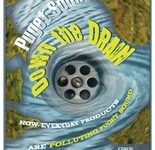Seattle, WA — Chemicals from everyday consumer products in our homes are polluting Puget Sound, according to a new study released today by the Washington Toxics Coalition and People For Puget Sound. Groups say policy changes are needed to eliminate harmful chemicals and restore Puget Sound.
The study, Puget Sound Down the Drain demonstrates for the first time that house dust contaminated with chemicals from everyday consumer products is hitchhiking on our clothes and heading down the drain to Puget Sound via washing machine rinse water and sewage treatment plants.
Many chemicals found in consumer products and household dust pose a serious threat to Puget Sound, contaminating its sediments as well as killer whales, salmon, and other wildlife.
“Most people would never think their shower curtains could pollute Puget Sound, but this study shows that chemicals in the products on our homes can actually make their way to the Sound,” said Erika Schreder, lead author of the study and staff scientist for the Washington Toxics Coalition. “The laws in place today allow chemicals that we know are harmful to go into products. As a result, our health suffers and so does the health of Puget Sound.”
“The state spends millions of dollars each year cleaning up pollution in Puget Sound, only to have the same sites polluted again,” said Heather Trim, Urban Bays and Toxics Program Manager with People For Puget Sound. “Eliminating chemicals toxic to the Sound at their source, including consumer products, is the only way to get off the toxic treadmill permanently.”
“I’ve worked for decades for a clean Puget Sound, and it’s shocking to hear that the products I bring into my home are part of the problem,” said James Rasmussen, a member of the Duwamish Tribe whose home was tested in the study. “Puget Sound is so important environmentally, economically, and socially. We need to do all we can to restore it to health for future generations.”
Researchers tested house dust and washing machine rinse water from six Puget Sound-area homes for the common family of chemicals called phthalates, which are hormone-disrupting chemicals that can harm aquatic wildlife. Phthalates are used heavily in everyday consumer products to make plastic pliable. Items that contain phthalates include products made of PVC plastic such as toys and shower curtains, personal care products, and many home and building products like vinyl flooring.
“We all want to do our part to help save the Sound, but consumers can’t take care of this problem by themselves,” said Schreder. “Until manufacturers stop using harmful chemicals in their products and policymakers put in place policies to ensure these chemicals aren’t used, consumers and orcas will continue swimming in the same toxic sea of chemicals.”
The study’s additional findings include:
- Phthalates used in consumer products were present in the house dust and laundry rinse water from every home tested. In all but one home, the phthalate DEHP was present at the highest concentrations. DEHP is used in building materials and household products like vinyl shower curtains and flooring.
- Seventeen percent of the total phthalate load entering wastewater treatment plants, or 2,110 pounds of the phthalate DEHP, comes from everyday consumer products.
- Laundry detergent may also contain phthalates. One popular detergent tested contains phthalates, and if this detergent were used in every Puget Sound home, the study estimates 87 pounds of the phthalate DEP would pollute Puget Sound from laundry detergent alone.
The study identifies key actions the state must take to reverse the toxic tide of consumer products and restore Puget Sound to health, including:
- Enacting legislation to ensure only the safest chemicals are used in products.
- Taking action to phase out the use of chemicals posing the greatest threat to Puget Sound’s health.
- Helping industry switch to safer alternatives and away from chemicals known to be harmful to Puget Sound.
- Requiring companies to disclose what chemicals they are using to manufacture products.
- Fully funding Puget Sound Partnership Action Agenda items that prevent toxic chemical pollution.
For Press Questions:
Ivy Sager-Rosenthal, Washington Toxics Coalition, 206-854-7623
Heather Trim, People For Puget Sound, 206 351-2898

